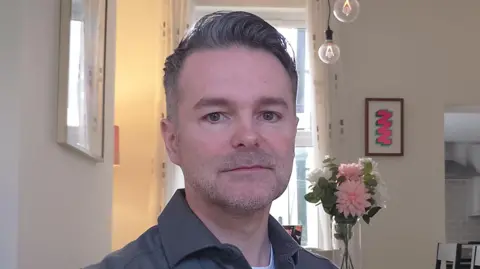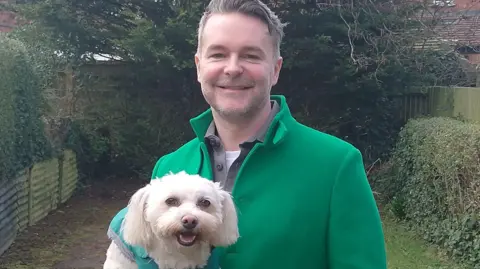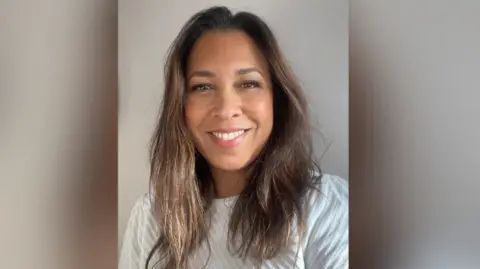I'm adopted and it took decades to discover potentially fatal condition
 BBC
BBCA man who was adopted at birth is calling for adoptees to have better access to their medical history after he only learned he had a potentially fatal condition once he met his biological father in his 30s.
Chris Tennyson, who is 38 and lives in Belfast, met his birth father for the first time in 2019.
It was then that he became aware that he needed to be tested for malignant hyperthermia.
He subsequently tested positive for the disease.
Malignant hyperthermia - also called malignant hyperpyrexia - is a rare condition in which people who are affected can experience a rapid and dangerous rise in body temperature.

What is malignant hyperthermia?
The condition, which runs in some families, can mean some anaesthetic drugs and gases can cause a rapid and dangerous rise in body temperature, according to the NHS.
Chris said that he could have had a very severe reaction to "certain anaesthetic gases that would be used for routine operations or certain pain medications".
"Had that been administered to me there is a chance I could have had a fatal reaction and died."
Chris met his birth mother in 2011 and said social workers told him he was not allowed to ask her questions about his birth father.
"With the passage of time, information did come my way which informed me of who my birth father was," he said.
"This information about the condition could have been made available to me from the year 2000 when it became discovered in my birth father's family.
"I think that when social workers are facilitating contact between adopted people and birth families there should be an open conversation with all parties about the possibility of medically-inherited conditions and the potentially fatal impact of that."
Chris believes that it is a human rights issue.
"For me, there is something about the value of myself as a person," he said.
"I should have been entitled to that information about myself and there needs to be change to ensure that other adoptees have that as well.
"No barriers should be put in an adoptee's way when they are asking questions about their identity because it could be life saving to have that information."
How many adoptees are there in Northern Ireland?
There is no central record of the number of adoptees living in Northern Ireland.
However, figures from the Adopted From Care in Northern Ireland report show that during the year ending 31 March 2024, 97 children were adopted from care in Northern Ireland.
 Charlotte Jay
Charlotte JayCharlotte Jay, an adoptee community development officer with Adoption UK, said Chris's experience is very common.
"Adoptees face many inequalities in their lives and I think access to healthcare is one of those," she said.
"I think not knowing your medical history could literally mean life or death in some circumstances."
She said there is no law in the UK that guarantees adoptees access to historical medical records and "that needs to change".
"I think it adds to the trauma.
"I think having that lack of medical information can be a factor for your whole life and it's not just for adoptees ourselves but it's also for adoptees' children as well."
 PA
PASDLP assembly member Matthew O'Toole, who has raised the issue at Stormont, said "it's really important" that adoptees can access full health information.
"They need to be able to access the most complete information possible and so we are really keen the Department of Health does all it can to complete that process."
Disclosure
The Department of Health (DoH) said an adoption agency is required by law to obtain and keep a record of information about the child's health.
The agency also has discretion to disclose information to adopted adults seeking access to their information, taking into account the welfare and interests of the adopted person with those of any third parties whose information may be held.
The department said that efforts are being made to encourage greater disclosure of medical information known at the time of the adoption.
It added that it is working to ensure that appropriate records of care are maintained while ensuring all steps are taken to respect the privacy of the adopted person and their family.
The Southern Health and Social Care Trust also said it is committed to working with regional colleagues to continue to strengthen and improve adoption practice.
